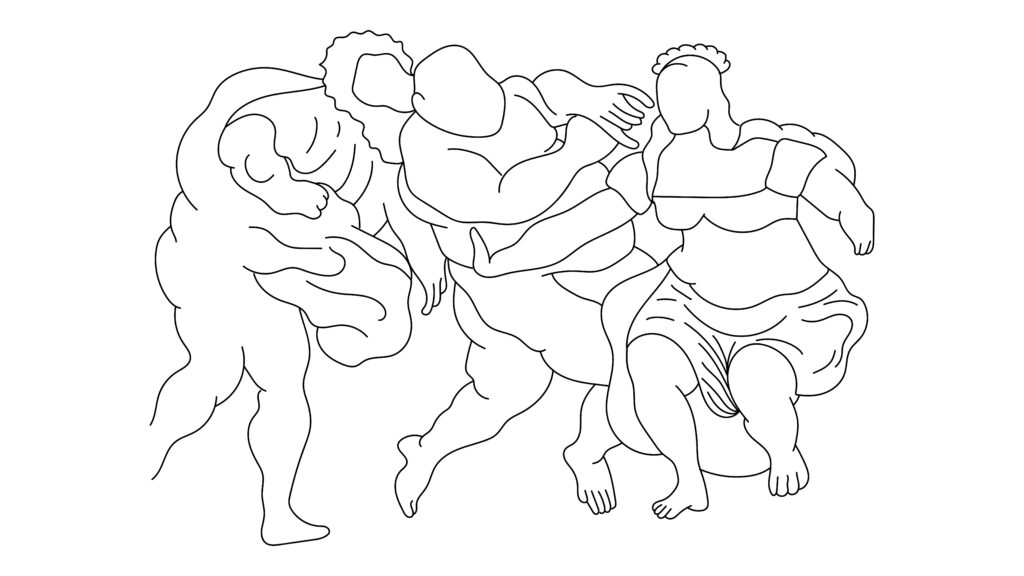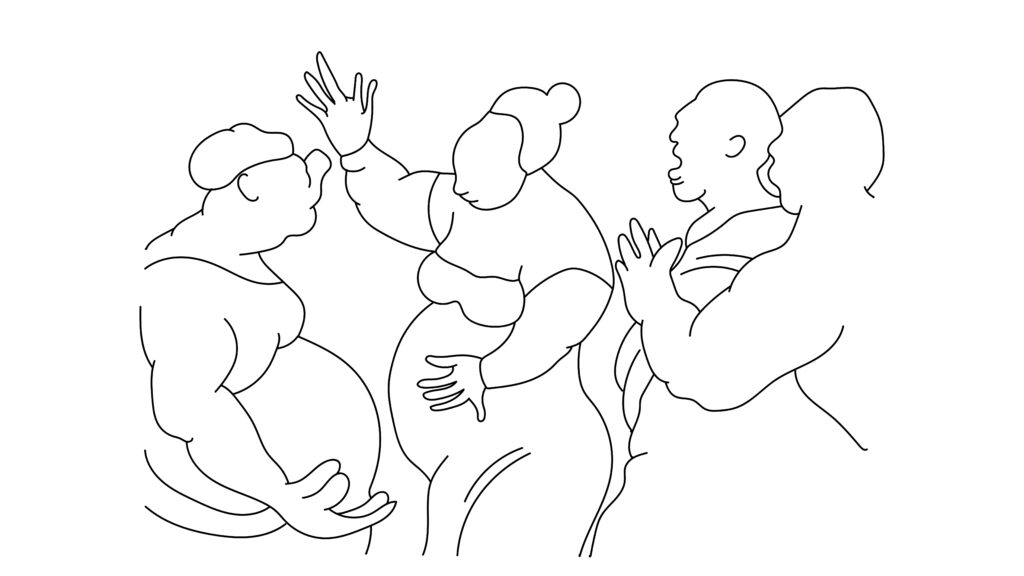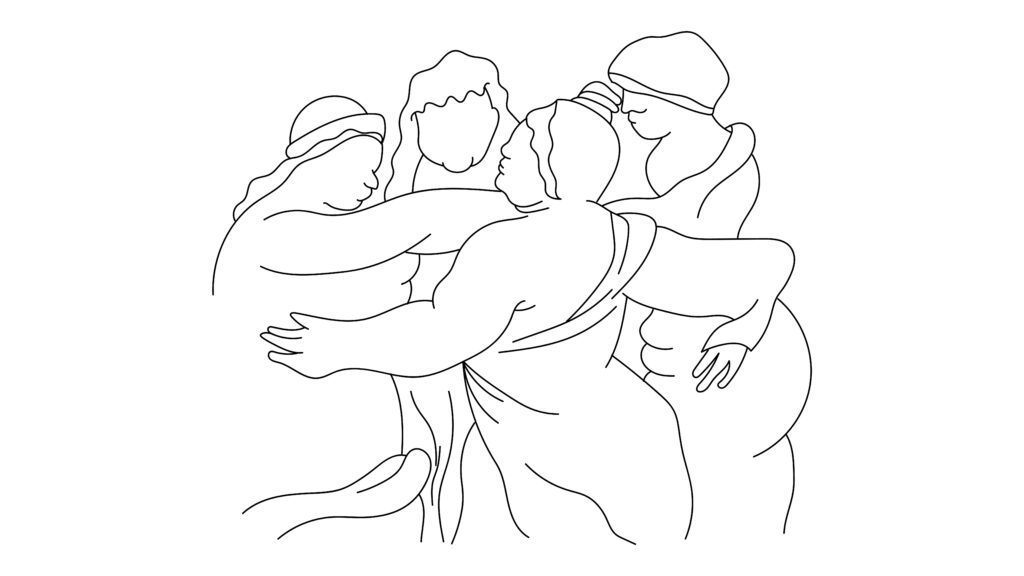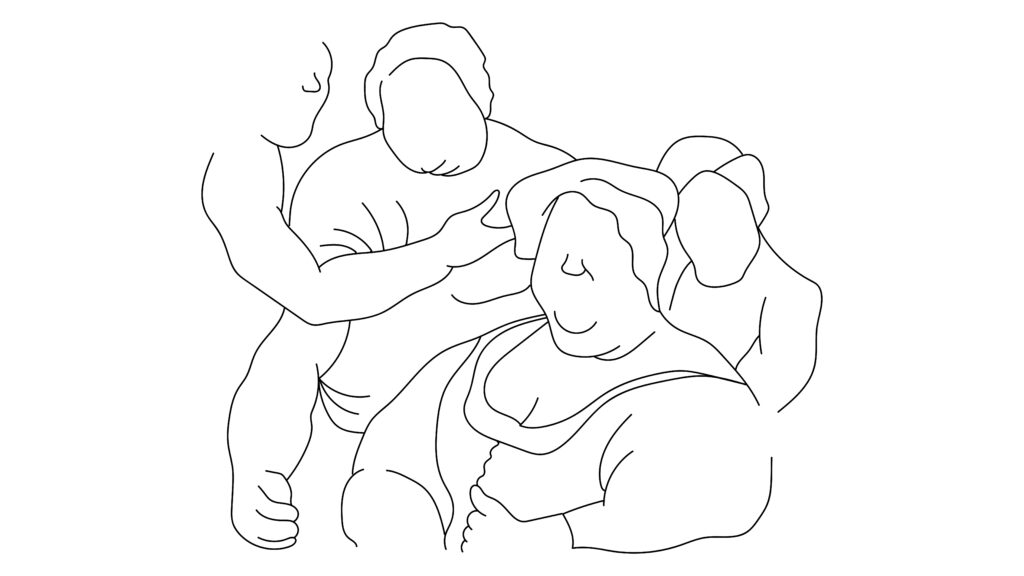The F word
by Ajša Zdravković

As a child, I wasn’t really aware of my fatness until the kids in my school started pointing at me, sneering and joking amongst themselves. Decades later, having come to terms with the fact that my body is indeed fat, I am now met with a general sense of pity: “No you’re not fat!” or “Don’t say that about yourself!”. Yes, with exclamation marks; as these words often come with the bossy tone of the other person doing their best to convince me that I’m not fat. I’ve realised over the years that calling myself fat has only helped me be more in tune with my body, but for other people, it’s clearly a slur they’d rather not hear. The word has also become part of an ingrained cultural script, with the casually moaned “I’m so fat”, coming from the changing room next to yours in a clothing store. For me, it’s a neutral description of my body size and a way to affirm that I unwaveringly stand against discrimination of any kind.
A weapon used against us since the dawn of time; insinuating laziness, failure, dirtiness, gluttony, worthlessness, ugliness, unhealthiness, smelliness, ignorance, unlovability, disease. It has become a word that the fat community has been working tirelessly to reclaim. I myself am in no way immune to these descriptors; they are forever a part of me, due to the relentless reminders. I also recognise that we are inherently wired to be cautious about infectious diseases, and fat people may be perceived as a potential threat by certain subconscious parts of people’s minds. Because of all of the above, I have struggled with my relationship to eating, my body, my self-worth, my wants and needs, spaces and other people for as long as I can remember. Every time I eat a pastry, the crunch is accompanied by the lingering voice of someone saying “have you tried keto?”.

Fat is a word that encompasses a marginalised identity, an identity that stands firm in body politics and anti-racism. In her book Fearing the Black Body, The Racial Origins of Fat Phobia, Sabrina Strings details with extensive research how fat bodies have been racialised for over two hundred years, targeting Black women in particular, classifying them as “diseased” and “a burden on the public health care system”. She deep dives into 19th century publications and finds troubling texts; articles warning middle-class American white women that they needed to watch what they were eating. These magazines clearly stated that a thinner body was the most appropriate form for white protestant women. They were told to eat as little as was necessary in order to affirm their Christianity and of course, their racial superiority.
Strings states clearly that fat phobia dug its roots in the Transatlantic slave trade, in which colonists pushed the narrative that Black people were prone to gluttony and deviance, and that their love of food caused them to be fat. European colonists claimed their moral superiority, valuing self-control, which made them thin, and, according to them, “the superior race”. Larger bodies were considered undeserving of freedom. When I use the word fat, I am confirming my desire for freedom, and my firm anti-racist stance. I’d like people to acknowledge that, when I call myself fat, I’m indeed also doing my utmost to sever the ever-growing roots of what was planted during the Transatlantic slave trade. I’ve read that book multiple times and remain baffled that our bodies were and still are used to push a racist agenda. Fast forward a decade or two and these negative discourses about fat people have morphed into the notion of personal responsibility and the need for people to be productive members of society. Ah… capitalism.

So why do we want to reclaim the word fat? A lot of people may think it’s just one of those fads, a fleeting moment of liberals just “doing that again”, to affirm their identity. I see the eyes rolling. I’d like to argue as a cis-white queer woman, that, for me, it truly has nothing to do with that, but has everything to do with standing up against racism and ableism in particular. I know that for a lot of us humans, regardless of our gender or the body we’re in, being kind to ourselves is one of the most tiring experiences, especially when dealing with a disability, chronic illness or pain. Beyond self-acceptance or self-kindness, using the word fat to describe my body is a radical act of protest.
I think sometimes when people hear the word “fat phobia”, they picture a fat person getting made fun of for being fat. While that’s one tiny consequence in the pool of thousands of nefarious effects, the others are far more insidious than that and go far beyond what people generally imagine. Fat phobia is not just a problem for fat people, it causes everyone to hate their body, regardless of their size. It upholds unjust systems for everyone, so that they can appear “good” enough not to be treated the way they know fat people are treated. Fat phobia has negative effects on anything life-related; from family and romantic relationships, to the workplace, to healthcare, to clothing, accessibility. Doctors fail to provide adequate care and timely diagnosis and treatment due to all kinds of assumptions which affects fat patients greatly. Fat trans people are oftentimes turned away for gender-related medical procedures due to medical fat phobia and outdated and incorrect beliefs regarding BMI. It trickles down into what people consider mundane aswell, like some chairs (I call them the fat phobic chairs) squeezing our hips and thighs so hard we can barely smile at the dinner table with friends.

It’s incomprehensible to me that most fat phobic people don’t acknowledge these life-altering and sometimes deadly factors, and that most people who are afraid of fat people or being fat only see the appearance related consequences. Fat-shaming is stitched so deeply into the very fabric of culture. I see it on social media every day, and it’s becoming more and more unrecognisable. With fitness trends and diet fads and “clean girl eating” schedules, fat phobia has become so intricately tucked into to pretty social content it goes completely unnoticed. There’s a very thin line between caring for your health and beating yourself up, and that line often gets blurred furthermore with an overload of content online.
By reclaiming the word fat, I want to see our community not only at the forefront of cultural shifts and durable change, but I hope to see the uncomfortable conversations we’ve been having for decades actually have some positive effect on future generations. It burdens me immensely to think that another young human would have to go through what us fat folk have been through before, with even more societal layers of oppression such as social media or AI to add to the mix. People usually roll their eyes when the word fat phobia pops up in a conversation or fat phobic behaviour is called out, but when we recognise where it comes from, rooted in racism and ableism, we have a duty to put an end to it by all means possible.
